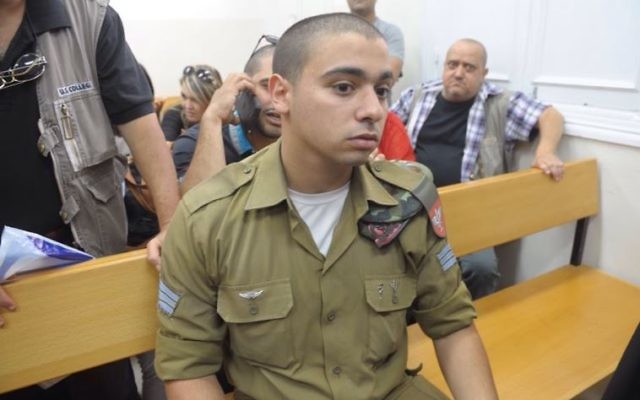Azaria trial underway
One of the most dramatic court cases in Israeli military history got into full swing this week, as prosecutors cross-examined an IDF soldier who fatally shot a Palestinian who was lying on the ground.
One of the most dramatic court cases in Israeli military history got into full swing this week, as prosecutors cross-examined an IDF soldier who fatally shot a Palestinian who was lying on the ground.
Elor Azaria said that he feels “thrown to the dogs” by the establishment, after doing his best as a soldier.
He feared that Abdel Fattah al-Sharif, the Palestinian man who had stabbed a soldier a few minutes previously and been stopped but not killed by Israeli forces, was concealing a bomb and was about to carry out a “huge” attack. An ambulance driver had shouted to express this fear, and Azaria claimed that he saw the man moving, meaning that he could have been preparing to attack, just before he shot.
The case of Azaria’s shooting in March is dividing Israel, with many citizens backing the military for taking a strong stance on unauthorised violence against a Palestinian, while part of the country says that as a soldier acting in a difficult situation, he should be treated leniently and not subjected to court proceedings.
Azaria lambasted the political and military leaders in Israel who criticised his actions before the trial, accused his superiors of lying in their testimonies, and complained that his commander slapped him after the incident. He alleged that once a video of the incident surfaced – a development that propelled the army into controversy over the incident – his superiors “just used me to clean the hands of the army”.
But prosecutors have been challenging his version of events, especially his insistence that he didn’t shoot because of a personal desire to attack but because the Palestinian on the ground seemed to pose danger.
Prosecutor Nadav Weismann argued on Tuesday that the time scale of Azaria’s actions suggests that he did not act out of a sense of immediate danger, as he waited two minutes to shoot after the ambulance driver expressed his fears that the Palestinian concealed a bomb. Azaria rejected Weismann’s conclusion, and also said there was no truth in suggestions that he acted out of revenge for terrorist action against another soldier. Azaria claimed that if it was a matter of revenge he would have got closer.
The court has heard from Azaria’s company commander, Tom Naaman, that in his view the Palestinian who Azaria shot posed no danger. Azaria has claimed, however, that his superiors were not vigilant enough on the scene.
The trial continues.
NATHAN JEFFAY


comments